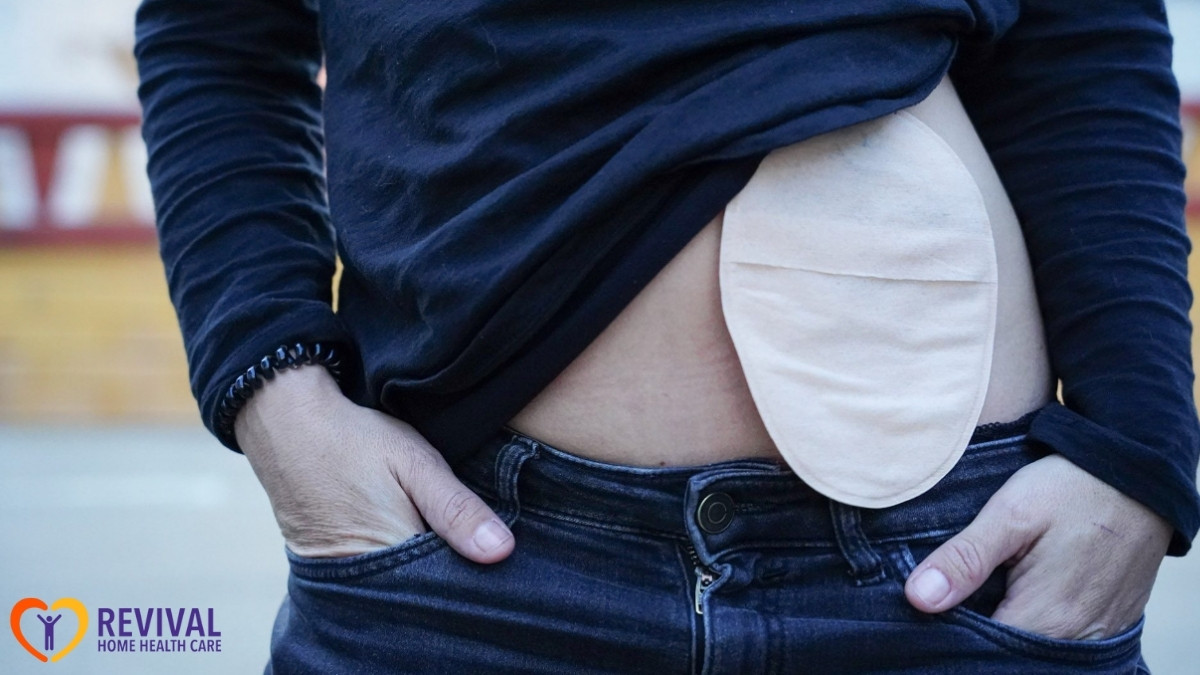Key Points:
- Home health nurses recommend practical tips to help ostomy patients manage their stoma and supplies with confidence and comfort.
- Emotional adjustment is as important as physical care, and small habits can ease the transition to daily life with an ostomy.
- In-home nursing support can make a big difference in building skills, preventing problems, and improving quality of life.
Understanding Life With an Ostomy: What You’re Facing
Living with an ostomy often means adjusting to new routines, sensations, and emotions. Whether it’s a colostomy, ileostomy, or urostomy, you now have a stoma that redirects waste to an external pouch. This change can feel daunting at first.
Many people worry about leaks, odors, and how others may perceive them. Some feel unsure how to clean and care for the stoma properly. Others are concerned about their clothes, intimacy, and returning to social activities.
These are valid concerns, and in-home nurses hear them all the time. Luckily, with proper support and small, manageable steps, these worries can be replaced with confidence and comfort.

Mastering Ostomy Care: Practical Tips From Home Health Nurses
Caring for an ostomy is a skill you can learn, and home health nurses are here to guide you through it. Below are practical, step-by-step tips from professionals who help patients every day.
Establishing a Reliable Routine
Creating a daily ostomy care routine helps minimize surprises and keeps your skin healthy. Try to empty and change your pouch at the same time each day when output is at its lowest, often early morning. Home health nurses can help you identify a rhythm that works best for your body and schedule.
Keep all your supplies—pouches, barrier rings, skin prep wipes—organized and in a designated spot. Many patients use a portable kit for when they’re out and about.
Keeping Skin Healthy Around the Stoma
Healthy skin is key to comfort and preventing infection. Nurses emphasize the importance of regular checks and good technique.
Make sure the opening of your barrier fits snugly around your stoma—too loose and you risk leaks, too tight and you can injure the tissue. Gently clean the skin with warm water (no harsh soaps) and let it dry completely before applying your new appliance.
If you notice redness, itching, or open sores that don’t improve, contact a nurse or your doctor right away.
Managing Leaks and Odor
Worries about leaks and odor are common, but manageable. With a little know-how, you can prevent most of these issues.
Home health nurses recommend changing your pouch before it’s too full (about when it’s 1/3 to 1/2 full) to prevent weight from loosening the seal.
For odor control, emptying the pouch regularly, using deodorizing drops, and eating foods that don’t produce excess gas can help.
Dressing Confidently
Your clothes can still reflect your personal style, and some simple adjustments can make life with an ostomy more comfortable.
You don’t have to buy a whole new wardrobe, but you may need to experiment a little. Many patients find that high-waisted pants, stretchy waistbands, or wrap-around garments feel more secure and help conceal the pouch.
Ostomy belts or wraps can also keep your appliance close to the body and more discreet under clothing. Nurses can guide you to options that suit your lifestyle.
Supporting Your Emotional Well-being
Caring for your emotional health is just as important as managing the physical aspects of an ostomy. In this section, we explore how to process feelings, maintain relationships, and regain confidence.
Adjusting Emotionally to an Ostomy
An ostomy doesn’t just affect the body—it also affects how you see yourself. It’s okay to grieve your old routines and feel anxious about this new reality.
Home health nurses often encourage patients to join support groups, either in-person or online, to connect with others living with an ostomy. Sharing your feelings with family, friends, or a counselor can also help you move through the adjustment period.
Resuming Social Activities and Intimacy
Socializing and intimacy might feel intimidating at first, but these parts of life are still very much possible.
Many people worry about how an ostomy will impact their relationships and social life. The truth is, with planning and open communication, you can still enjoy outings, sports, and even intimacy.
Home health nurses can offer strategies for managing your pouch discreetly in public and provide advice about intimacy and body confidence.
Knowing When to Ask for Help
It’s okay to need help—sometimes a nurse’s advice or visit can solve issues before they grow into bigger problems. Here’s when to reach out.
Even with the best preparation, you may run into questions or problems along the way. Some situations where calling a nurse or doctor is a good idea include:
- Persistent skin irritation, pain, or bleeding around the stoma.
- Output that’s unusually watery, very thick, or stops completely for more than a few hours.
- Repeated leaks or difficulty keeping the pouch in place.
Home health nurses can often visit you at home to assess the situation, teach you techniques, and help you avoid unnecessary trips to the hospital.

Tips for Traveling With an Ostomy
With a little preparation, travel is absolutely possible with an ostomy. Nurses recommend packing at least twice as many supplies as you think you’ll need, in both carry-on and checked luggage if flying.
Bring a travel-size cleaning kit, disposable bags, and an extra set of clothes just in case. Let your traveling companions know if you need extra time or privacy.
Some patients also carry a card explaining their medical condition to ease airport security checks.
Seek Out In-Home Support When Needed
Sometimes, having a professional by your side at home is exactly what you need to feel secure and supported.
It’s not always easy to figure out everything on your own. Home visits from skilled nurses can make a huge difference, especially in the first weeks after surgery.
They can help you troubleshoot problems, adjust your routine, and ensure you’re caring for your stoma properly. In-home care is especially valuable for people with limited mobility or those who simply prefer guidance in the privacy of their own home.
Take the Next Step Toward Comfort and Confidence
If you’re looking for compassionate, professional support, Revival Home Health Care offers in-home ostomy care in New York designed to meet you where you are—literally and emotionally. Our experienced nurses can visit you at home to guide you through your recovery, teach you best practices, and help you live more comfortably with your ostomy.
Reach out to us today to learn more and schedule a visit! Let us help you regain confidence and peace of mind, one step at a time.


 75 Vanderbilt Ave Staten Island, NY 10304
75 Vanderbilt Ave Staten Island, NY 10304 info@revivalhhc.org
info@revivalhhc.org 718.629.1000
718.629.1000